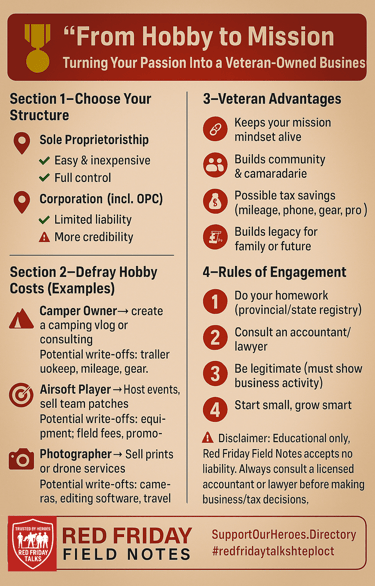“From Hobby to Mission” Turning Your Passion Into a Veteran-Owned Business
For many of us, it starts with a hobby we already love—airsoft, camping, fishing, photography, restoring old vehicles. By turning that passion into a business, you can offset costs, build community, and create a foundation for a future legacy.
Bob McTaggart - RED Friday Field Notes
8/28/20254 min read


When the uniform comes off, the mission mindset doesn’t. Veterans and first responders know the power of discipline, teamwork, and purpose. That’s why setting up a business isn’t just about money—it’s about staying on mission.
For many of us, it starts with a hobby we already love—airsoft, camping, fishing, photography, restoring old vehicles. By turning that passion into a business, you can offset costs, build community, and create a foundation for a future legacy.
Choose Your Structure
🎯 Sole Proprietorship
Simple and inexpensive to register.
Income is taxed as your personal income.
Full control of every decision.
⚠️ Downside: unlimited liability. Your personal assets are on the line.
🛡️ Corporation (including one-person corporations)
A separate legal entity.
Protects your personal assets from business liabilities.
Easier to raise money and more credible to banks and partners.
⚠️ More complex and costly, with annual filings and stricter rules.
👉 Pick the structure that matches your risk tolerance, growth goals, and long-term plans.
Defray the Costs of Your Hobby
A registered business can allow you to legitimately write off expenses that would otherwise come out of pocket—provided you’re actually operating as a business.
Examples from the field:
🏕️ Camper Owner – Start a camping vlog or guiding service → potential write-offs: trailer maintenance, mileage, gear.
🎯 Airsoft Player – Host events, run a team, sell patches → potential write-offs: equipment, field fees, promotion.
📸 Photographer/Drone Pilot – Sell prints, offer aerial services → potential write-offs: cameras, software, travel.
Why Veterans Should Lock On
Mission & Purpose: Running a business keeps your edge sharp and your head in the fight.
Community Impact: Your work builds connections and creates new spaces for people to rally.
Tax Advantages: Mileage, gear, phones, even part of your home office may qualify.
Legacy: A side hustle today can grow into a family business tomorrow.
Rules of Engagement
Do Your Recon: Learn your province’s or state’s registry requirements. Every AO is different.
Call in Support: Consult a licensed accountant or lawyer. Don’t wing it.
Stay Legit: Show real business activity—sales, marketing, outreach. No smoke and mirrors.
Start Small, Grow Smart: Build steady, reinvest, and scale with discipline.
Final Word – Stay on Mission
For veterans and first responders, setting up a business is more than paperwork. It’s about protecting your flank, turning passion into purpose, and building something that lasts.
Whether it’s a camper, an airsoft loadout, or a camera kit—you can transform your hobby into a legitimate, tax-smart business that keeps you connected, disciplined, and moving forward.
⚠️ Red Friday Field Notes Reminder: This intel is for education only. We accept no liability. Always consult a licensed accountant or lawyer before making business or tax decision
Where to register (official links)
Federal (optional, if you want Canada-wide corporate status)
• Incorporate federally (Corporations Canada).
ISED Canada
• After federal incorporation, you must also register in each province/territory where you do business.
ISED Canada
British Columbia
• Sole proprietorship / partnership: BC Business Registry.
Province of British Columbia
• Incorporate a company (Corporate Online).
Corporate Online
Alberta
• Register a business name (sole prop / trade name).
Alberta.ca
• Incorporate an Alberta corporation.
Alberta.ca
Saskatchewan
• Register a sole prop / partnership or incorporate (ISC Corporate Registry portal).
corporateregistry.isc.ca
• Province “Start a Business” overview.
Government of Saskatchewan
Manitoba
• Register an unincorporated business (sole prop / partnership) – file online.
companiesoffice.gov.mb.ca
• Incorporate a Manitoba corporation (Companies Office).
companiesoffice.gov.mb.ca
Ontario
• Register a sole proprietorship (Ontario Business Registry).
Ontario
• Incorporate an Ontario corporation (ServiceOntario).
Ontario
Québec
• Immatriculer une entreprise individuelle (sole prop, Registraire des entreprises).
Quebec
• Constituer une société par actions (provinciale).
Quebec
New Brunswick
• Register / renew a business name.
Government of New Brunswick
• Incorporate via the Corporate Registry Online Filing Centre.
snb.ca
Nova Scotia
• Register a sole proprietorship (Registry of Joint Stock Companies).
Government of Nova Scotia
• Incorporate a limited company (RJSC).
Government of Nova Scotia
Prince Edward Island
• Business name registration (how-to + registry).
Government of Prince Edward Island
• Corporate/Business Registry portal (file and manage incorporations).
ocbr.princeedwardisland.ca
Newfoundland & Labrador
• Sole proprietorships/partnerships: there is no provincial business-name registry in NL (not required).
Government of Canada
Government of Newfoundland and Labrador
• Incorporate / Registry of Companies (Service NL portal).
Government of Newfoundland and Labrador+1
Yukon
• Yukon Corporate Online Registry (YCOR) — sole props, partnerships, corporations.
yukon.ca
Northwest Territories
• Register a business name (sole prop/partnership) — Corporate Registries.
justice.gov.nt.ca
• Incorporate or extra-territorial registration — Corporate Registries.
justice.gov.nt.ca
Nunavut
• Register a business name (Declaration of Use of a Business Name — Legal Registries).
nunavutlegalregistries.ca
• Incorporate a Nunavut corporation (BCA package — Legal Registries).
nunavutlegalregistries.ca
Canada-wide quick facts (choose your structure)
Using only your own legal name? In most provinces/territories a sole proprietor does not have to register a business name (e.g., “Jane Doe”), but adding any words (like “Jane Doe Consulting”) usually triggers registration. Always check your local registrar.
Government of CanadaSole proprietorship = simple and low cost; income is taxed on your personal return; unlimited personal liability.
Corporation (incl. one-person corporations) = separate legal entity; limited liability; easier to raise capital; more setup/maintenance (annual filings, separate tax return), but can align better with growth and risk management. (For federal corporations, remember you still register where you carry on business.)
ISED Canada
Mandatory heads-up (Red Friday legal sanity check)
We accept no liability for the use of this information. Laws, fees, and forms change. You should and must consult a qualified professional (lawyer and/or accountant) in your province/territory for advice before choosing a structure or filing anything.
#VeteranBusiness #HobbyBusiness #StayOnMission #VeteranEntrepreneur #FieldNotes #supportourheroesdirectory #redfridaytalkshelp
